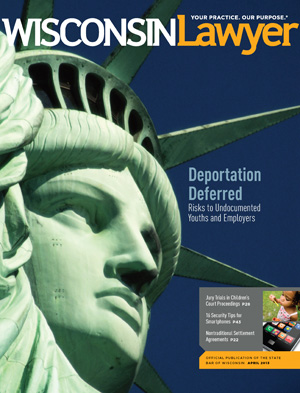
April 5, 2013 – In the April issue of Wisconsin Lawyer magazine, available online and in mailboxes soon, two Madison-based lawyers explain how federal immigration policy may impact the estimated 8,900 undocumented children living in Wisconsin.
In their cover article, “Deportation Deferred: Risks to Undocumented Youths and Employers,” attorneys Jessica Ozalp and Nilesh Patel also discuss how Deferred Action for Childhood Arrivals (DACA) – which grants qualifying youth (under 31) temporary relief from the threat of deportation – creates employment law pitfalls.
“Employers will be affected by the DACA policy when applicants and grantees seek old employment records, receive work authorization for new employment, or decide whether to remain with the same employer after receiving new authorization,” they write.
The article provides a primer on DACA, including eligibility requirements, while explaining practical and legal considerations for applicants and employers.
Dig deeper into this month’s magazine and you’ll also find an in-depth discussion about the usefulness of nontraditional settlement agreements, a viewpoint on whether jury trials in child proceedings are in the best interest of children, and much more.
Nontraditional Settlement Agreements
Do the terms “Mary Carter agreement” or “loan receipt agreement” conjure images of smoke-filled backrooms and underhanded dealings?
Historically, there may be some truth to this stigma, but they can be useful in modern-day complex multidefendant litigation, three Waukesha attorneys note in "No Longer a Back Room Deal: Nontraditional Settlement Agreements Revealed.”
In general, these types of agreements involve a plaintiff settling with one but not all defendants. These agreements may set a minimum recovery, with a maximum amount of liability, and the agreement may be kept a secret from non-settling parties.
“If steps are taken to prevent some of the harms these agreements have caused, these types of agreements may have benefits for both plaintiffs and defendants seeking to settle claims before trial,” write Matthew Rosek, Nicholas Rudman, and Andrew Christman of Waukesha-based McCoy Leavitt Laskey, LLC.
“Given the state of the economy and the added frugality of many corporations and insurance companies involved in litigation, the use of nontraditional settlement agreements appears to be on the rise,” they note.
In their article, the authors describe nontraditional settlement agreements, the benefits of using them, and how to create effective and enforceable ones in Wisconsin.
Jury Trials and the Child’s Best Interest
Attorneys Mary Sowinski (Waukesha) and Thomas Wiensch (Rhinelander) make an argument against jury trials in proceedings involving children in their article, “Contrary to the Child’s Best Interest: Jury Trials in Children’s Court Proceedings.”
The authors note the right of parents to have jury trials in TPR (termination of parental rights) and CHIPS/JIPS (children/juveniles in need of protection or services) cases. But they also note a compelling interest in protecting children from disruption and trauma.
“This article examines the basis for jury trials in these types of cases and argues that Wisconsin’s statutory choice is contrary to the best interests of children,” they write, noting a recent legislative recommendation to eliminate jury trials in these cases.
What Else is Inside the April Issue?
A Trends column on “Nonlawyer Ownership or Investment in Law Firms,” by Robert Denney, who takes a look at past and recent developments.
-
Dean Dietrich’s Ethics column on “Sharing Office Space with Other Businesses.”
Dietrich, former chair of the State Bar’s Professional Ethics Committee, notes
that sharing office space with other business people is permitted, but lawyers
should do so “cautiously.
-
Tom Watson’s Managing Risk column on
reporting potential malpractice claims.
The article notes that failing to report claims may result in loss of insurance
coverage. Watson, a Wisconsin lawyer, is a vice president and communications
director at Wisconsin Lawyers Mutual Insurance Company.
-
A Technology column titled “Top 16 Security Tips for Smartphones,” by
Sharon Nelson and John Simek of Sensei Enterprises. Top Tip? Encrypt.
-
A Final Thought from Jay Rothman, CEO of Foley & Lardner LLP in Milwaukee. In “Clients’ Interests Versus Nonlawyer Investors,” Rothman gives further insight on the wisdom on nonlawyer ownership and investing in law firms.
